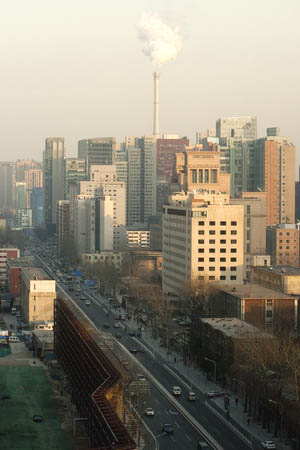Beijing, which aims to launch its carbon-trading system next year, is carefully calculating the city's greenhouse gas emissions inventory, said a local government official.
 A smokestack in Beijing. According to Beijing's pilot carbon emission-trading program, more than 600 companies with direct and indirect carbon emissions exceeding 10,000 tons per year will be included on a mandatory list for capping emissions. [Photo/Bloomberg] |
About 70 percent of Beijing's electricity consumption is generated outside the capital, so it is necessary to include the emissions caused by power generated in other areas, he said.
This is a new issue facing Beijing, and there are no examples to follow, so it must be dealt with in an innovative way, he added.
Due to Beijing's high proportion of externally purchased electricity, the city may consider a cap on emissions both from producers and consumers, Yao said, without elaborating.
The city is studying how to allocate the emissions quota to districts, companies and industries, Yao said, adding that pilot programs will start next year.
He didn't give a figure for the overall quota, which will be closely linked to the city's target to lower its carbon intensity - the amount of emissions per unit of GDP produced - by 18 percent during the 12th Five-Year Plan (2011-15).
Carbon emission trading is a market-based approach initially adopted by the European Union to control pollution. It caps emissions mainly from industrial plants and utilities, forcing them to buy carbon credits to cover their emissions output.
According to an implementation plan for Beijing's pilot carbon emission-trading program covering the period from 2012 to 2015, more than 600 companies with direct and indirect carbon emission exceeding 10,000 tons per year will be included on a mandatory list for capping emissions.
Bi Jianzhong, assistant general manager of the China Beijing Environment Exchange, said the city's carbon-trading program is likely to have two layers, one for direct emissions targeting producers, to be implemented next year, and the other for indirect emissions targeting consumers, likely to be implemented in 2014.
According to the implementation plan, the municipal government will offer a free quota on the amount of a pollutant that may be emitted by companies, but Bi suggested leaving about 15 percent of the overall quota for auction, in an effort to build a market-oriented system.
The National Development and Reform Commission announced early this year it would launch carbon-trading systems next year in five cities - Beijing, Tianjin, Shanghai, Shenzhen and Chongqing, as well as in Guangdong and Hubei provinces.
Coal may become a less competitive fuel than other options due to emissions trading. Beijing has drawn up a plan to cut its coal consumption to 15 million tons by 2015 and basically end coal use within the Fifth Ring Road.
Natural gas will be a major substitute for coal, Yao said in a joint interview earlier this week with media from China and South Korea. The city's use of natural gas will double to 15 billion cubic meters, or even higher, during the 12th Five-Year Plan, he said.
lanlan@chinadaily.com.cn
